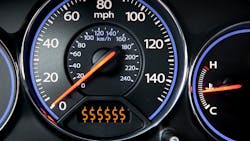I recently went to an out-of-town family wedding. Traveling by car, the trip took about eight hours to get to the location, and I encountered numerous traffic snarls along the way. Long road trips aside, upon my arrival, I noticed the new car of a family member. This person traveled half the distance I did in half the time but did so in a hybrid vehicle. It’s a nice-looking car with all the bells and whistles, but I could not help but think that their entire trip would not consist of any stops to refuel, whereas I fueled up twice for the round trip. The very reason I bring this up is that my trip consisted of me paying twice into the Highway Trust Fund (not to mention the toll fees, too), whereas the new hybrid vehicle, with zero need to refuel, didn’t pay a dime into the mechanism responsible for sustaining our roads and bridges.
I would love to say that this thought process is relegated solely to me, but it does define the policy-driven discussion on Capitol Hill as it pertains to paying for the much-needed, massively funded infrastructure plan under consideration. Clearly a political poison pill, increasing the federal fuel tax has already presented itself as the best cure-all for a problem that needs a solution. However, the conversation, as it pertains to funding, has now appeared in the infrastructure bill as a national pilot program for raising funds outside of paying directly at the pump in the form of a vehicle miles traveled (VMT) tax.
This column is not one that supports the development of such a funding mechanism but rather highlights the issues surrounding it and the need to address the vehicles that travel our roads without ever visiting a gas pump. At this time, a VMT remains an option that is unfeasible in its scope and surrounds itself with more questions than answers. The national test included in the bill represents a very real opportunity to finally find some answers to those questions.
First and foremost, any VMT fee should not be paired with or added to a federal fuel tax. Any notion of double taxation should be quelled right off the bat. The pilot program for all vehicles should look to address that concern prior to even getting off the ground.
We know the VMT is going to represent a higher cost to collect than the current fuel tax mechanism. Just how much that cost differential is remains to be truly vetted. While the administrative costs and hurdles dramatically outpace what we see with the fuel tax, in some cases, studies have shown these fees could run as high as 40%, whereas the current fuel tax collection system runs around 1%. This fact could serve as a death blow to any conversation that seeks to pay into a program that should be stretching the dollars collected to the furthest.
The idea of a VMT pilot program is not new. Geographically speaking, various states and regions have developed tests over recent years that seek to hash out the issues with such a policy and develop solutions that may remedy them. Undoubtedly, privacy concerns from the public almost always arise in the midst of these conversations, and a pilot program must address this as well. General fears that “big brother” is watching have repeatedly been raised. Reassuring the public that these programs are merely tracking miles, not location, is an uphill climb.
Infrastructure for the sake of infrastructure, so to speak, must also come into play. The fuel tax mechanism exists in a manner where everyone essentially pays at the pump. To make a pilot program and any future VMT successful, we must identify and vet a proper system that allows mileage to be reported and dollars to be collected. Alleviating the potential for fraudulent activity is also paramount because creating a system that is equal for all must truly be the endgame when considering such a mechanism of fundraising.
The opportunity is before us to examine new and more technologically advanced ways that could represent a departure from the past. In Congress, elected officials have acknowledged this through the language as it appears in the infrastructure bill. Make no mistake, the political will has disappeared as it pertains to raising the federal fuel tax, regardless of how many states seemingly do that very thing to address their state funding issues on an annual basis. However, we must make sure that we are prepared to address the questions surrounding any pilot program that examines the idea of taxing miles traveled. Only then can we be sure that everyone is on equal ground when it comes to properly financing and paying for our nation’s looming road and bridge work.
About the Author
David Heller
David Heller is the senior vice president of safety and government affairs for the Truckload Carriers Association. Heller has worked for TCA since 2005, initially as director of safety, and most recently as the VP of government affairs. Before that, he spent seven years as manager of safety programs for American Trucking Associations.

